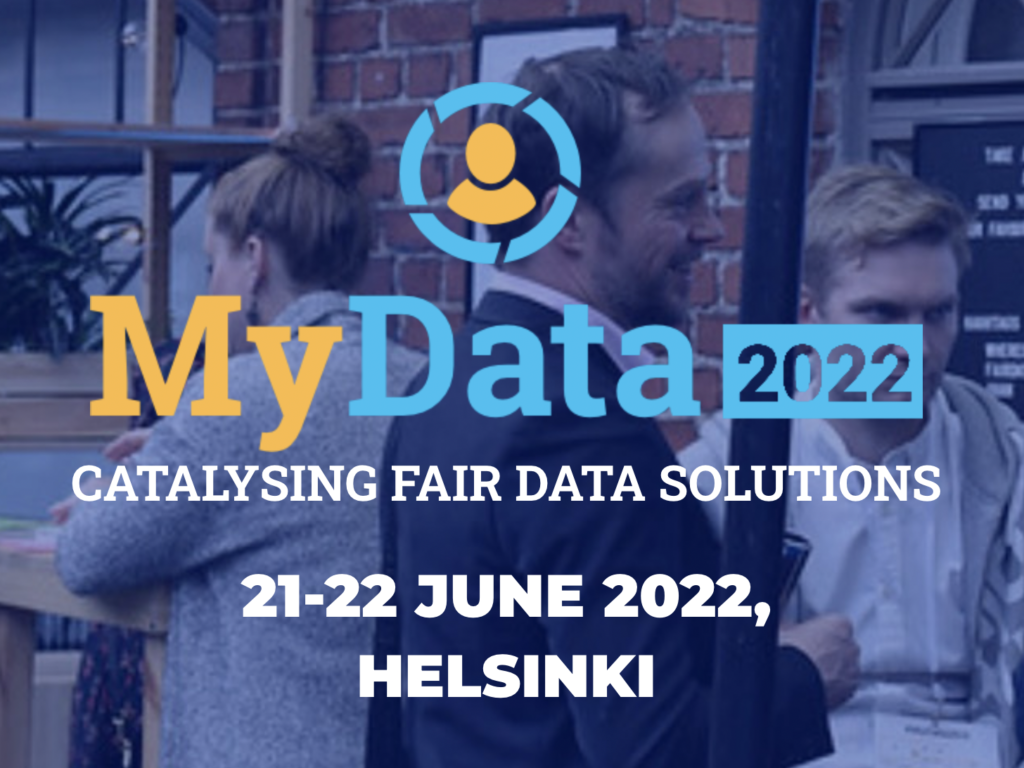Information is power, says MyData 2022 keynote speaker and a Pulitzer Prize-winning tech journalist, Julia Angwin: “Never before has so much information been collected about human behaviour. We have to decide how to place limits on the use of this power.”
At the same time, it is also in the interest of the companies to act ethically. “If your business doesn’t stand for something, it will fall down”, keynote speaker Chris Skinner claims. Skinner is the author of several influential books on digitalisation and popular fintech blog The Finanser. His latest book, Digital for Good, has just been published in late May.
Other speakers include Nnenna Nwakanma from the World Wide Web Foundation, Jyrki Katainen, the president of the Finnish think tank Sitra and former prime minister of Finland, Miapetra Kumpula-Natri, the Finnish “digi-MEP”, and Jasmina Byrne, Chief of Policy, UNICEF.
Our 20+ partners, including Avast, Capgemini, City of Helsinki, esatus, Sitra and Vastuu Group will share their solutions and insights for building more human and ethical data-driven businesses.
Timezone: UTC+3
21.6. 10:00–10:30
Julia Angwin – THE MARKUP: Power and privacy
Topics: Privacy, Big Tech and problems it creates, Need for fair data economy
- Never before has so much information been collected about human behavior
- We have to decide how to place limits on the use of this power
Pulitzer Prize-winning Julia Angwin has founded The Markup, a journalistic born-online media centering on data-driven investigations of tech and how it influences society.
After the talk at 10:30 the Press Meeting of the day 1.
21.6. 11:00–11:35
Jasmina Byrne – UNICEF: Building safer internet for children
Topics: Fair Data Business, Online safety, Education technology
21.6. 11:15 –11:35
Nnenna Nwakanma – WORLD WIDE WEB FOUNDATION: World Wide Web of data
MyData 2022 topics: Actionable Rights, Interoperability, Foundations
Nnenna will be speaking mainly on the 3rd, 5th and 6th principles of the Contract for the Web. In other words:
- The direct link between Data Privacy and the future of the web
- Why digital trust is mainly based on data trust
- The design solutions for 1 and 2 above.
She is member of UN’s Internet Governance Forum, a pioneer and continued advisor on internet governance in Africa, and Faculty at the Schools of Internet Governance and acknowledged as one of the “World’s Most 100 Influential People in Digital Government”, one of “Africa’s 50th Digital Personalities”.
21.6. 16:35–17:00
Marloes Pomp – NETHERLAND AI COALITION: The power of decentralised civilian initiatives during crisis situations: how data is used in Ukraine
Topics: Blockchain, digital identity, Web3
Pomp will take us to the journey that explores the power of civilian initiatives during crisis situations and how they are using data.
- First hand experience helping Ukrainian refugees leaving their identities behind
- What is the role of communities in Web3?
- DAO’s as organisational structures
Netherlands AI Coalition and the Dutch Blockchain Coalition are joint partnerships by government, industry and academia. Within the Netherlands AI Coalition Marioes is building a European Network of ELSA (‘Ethical, Legal and Societal Aspects’) labs.
22.6. 9:00–10:30
Chris Skinner – THE FINANSER: When markets change rapidly with technology, can regulators keep up?
Topics: Fair data economy,Blockchain, Cryptocurrencies, FinTech,
Should regulators have allowed Facebook to create a payment system? Should regulators ban bitcoin? Should regulators only allow banks to do banking?
Mr. Skinner has been an advisor to the United Nations, the White House, the World Bank and the World Economic Forum, and is a visiting lecturer with Cambridge University as well as a TEDx speaker. In recent years, he has been voted as one of the most influential people in financial technology by the Wall Street Journal’s Financial News and Thomson Reuters – and an advocate for cryptocurrencies.
After the speech: Press Meeting day 2.
22.6. 15:00–15:30
Maximilian Gahntz – MOZILLA FOUNDATION: The collective dimension of Data Governance. Your data is not about you only – it is also about the others.
Topics: Fair Data Business, Global Discussion
An individuals’ data does not only contain information or allow drawing inferences about that person, but in many cases also about others. It is therefore important to also account for the collective dimension of data — and how it can be leveraged to further the collective interest and prevent harm.
Maximilian Gahntz is a Senior Policy Researcher with the Mozilla Foundation’s Insights team.

